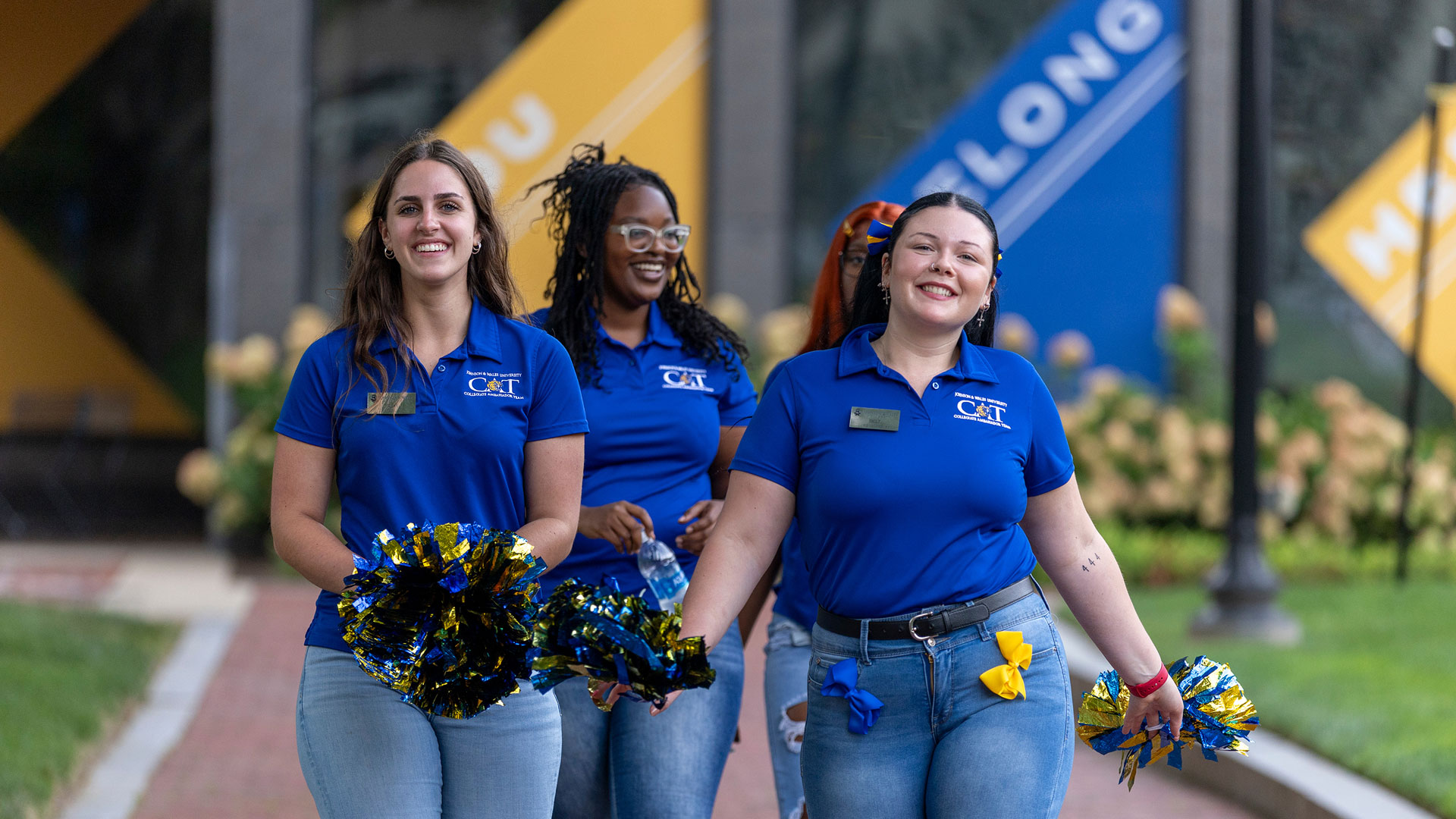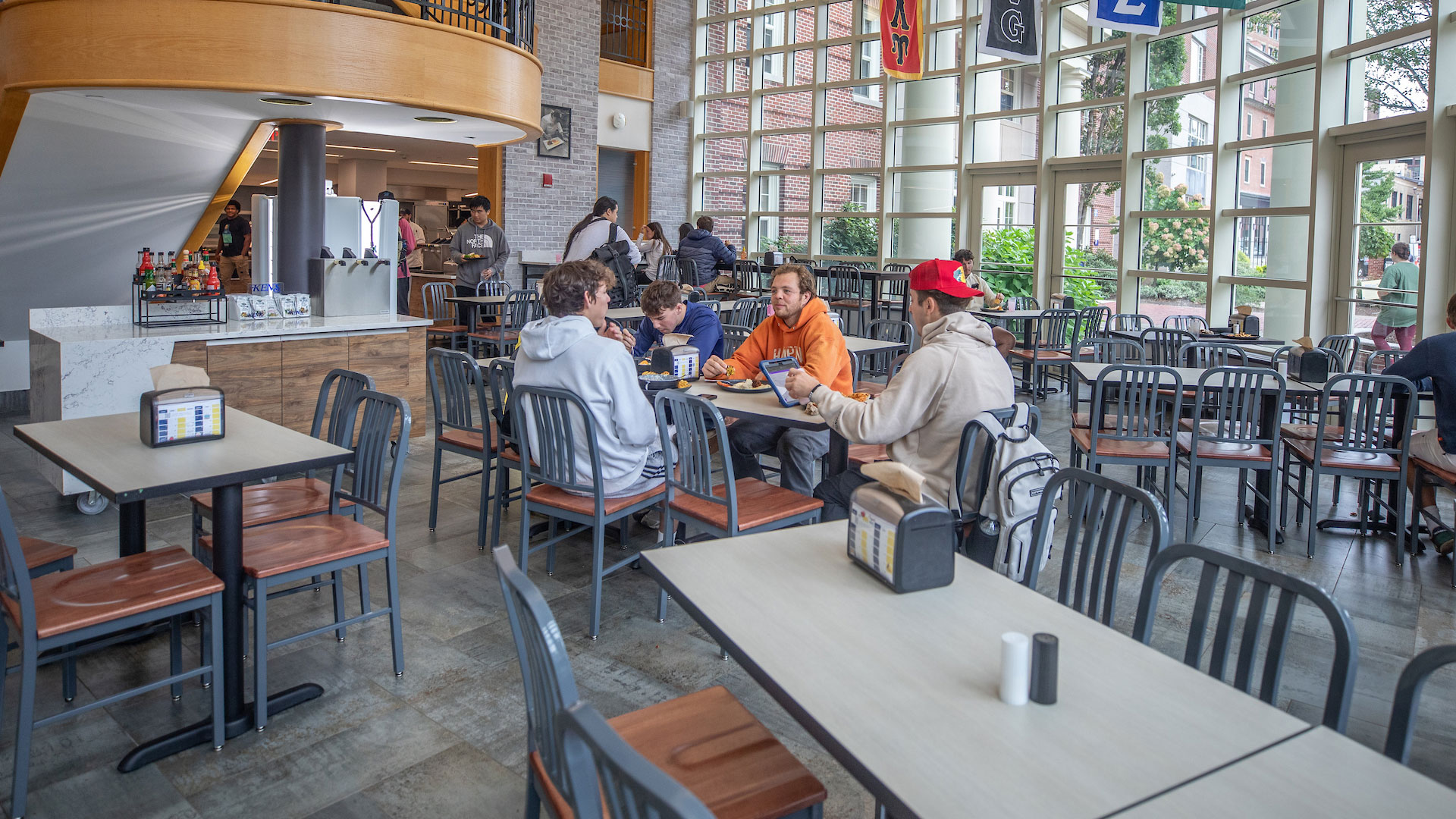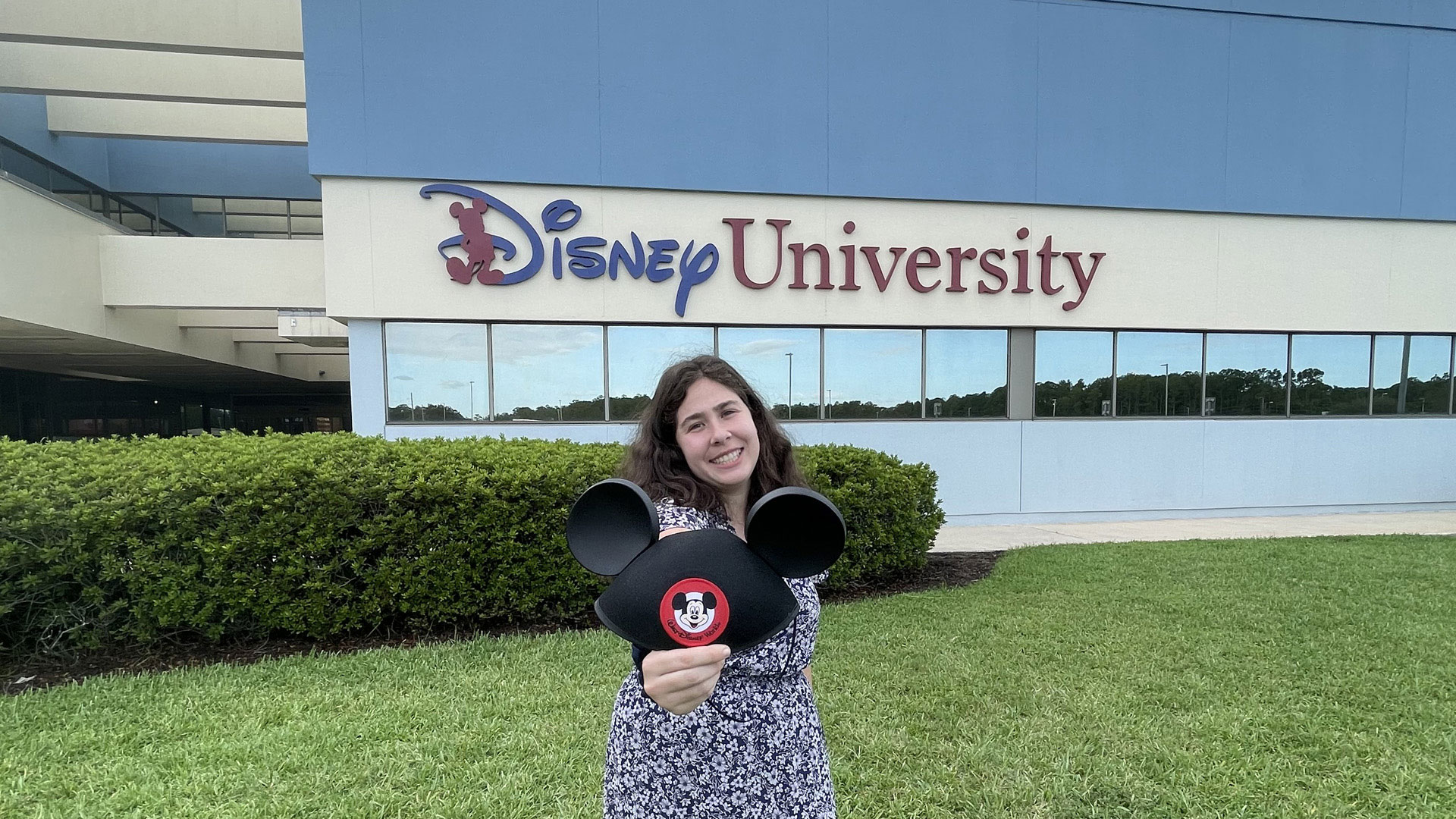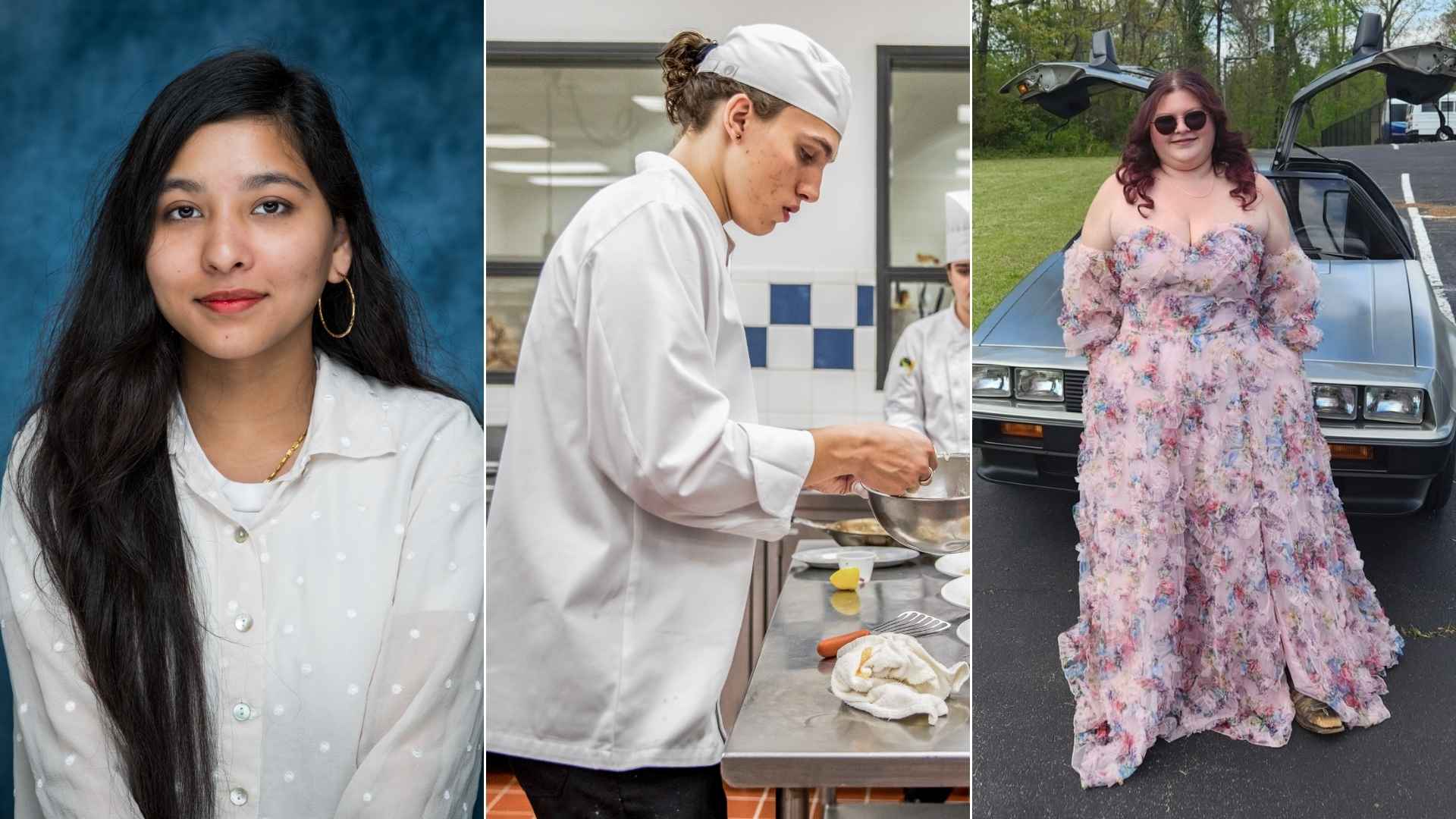Student Research, Design & Innovation Focus of Symposium
Inventing devices and instruments for accessibility and affordability. Making healthcare more compassionate. Reducing food waste. Highlighting racial disparities. Monitoring environmental impacts. Rethinking the design process.
These are just some of the innovative research and design projects Johnson & Wales students conduct and create. JWU’s inaugural Student Research, Design & Innovation Symposium held on April 25, 2023 gave a visual (and sometimes literal) taste of Wildcats’ work to the greater JWU communities of Providence, Rhode Island and Charlotte, North Carolina. This article highlights a random sampling of JWU student accomplishments from the 2022-2023 academic year.
Cross-Discipline Design for an Efficient and Affordable Physical Therapy Aid
What happens when a biology major and product design major walk into a room? No, it’s not a joke — it’s the type of cross-disciplinary collaboration JWU is known for. This past year, Biology senior Abigail Medeiros ’23 and Product Design senior Jonah McGowan ’23 co-created a multi-modal, assistive and augmentative neurological-based rehabilitation device to help clients with rotator cuff injury, stroke, traumatic brain injury or other conditions get better range of motion in their impacted shoulders.
The prototype — much of which was covered in black material to protect its intellectual property, as it is currently being patented — incorporates touch-capacity textiles, washable microprocessors, and conductive thread. The components work together to accurately assess range of motion, while angle measurements of height and wingspan ensure that each individual’s body fits with the device.
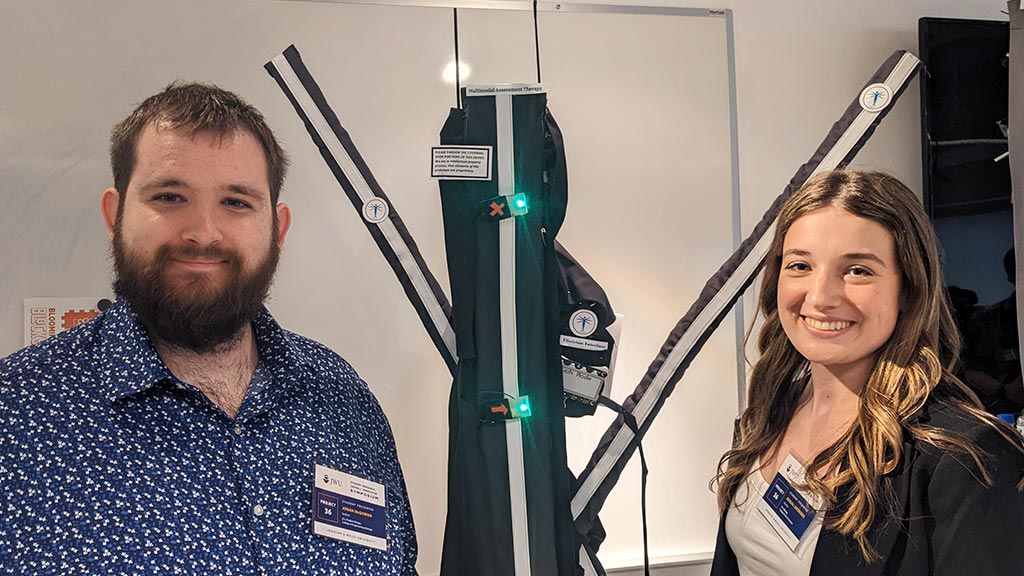
Medeiros explained the importance of the device, which she perfected after having shadowed a physician assistant at Ortho RI and completed a JWU internship at Tech X. “If a practitioner guesses wrong about what angle a person can move their arm, the client won’t progress and won’t recover. The assessment for range of motion is really crucial to get right, and this supports a quick, easy and reliable assessment to enhance rehabilitative care and ensure inclination of recovery.”
The device’s game-based element uses LED lights connected to fabric buttons to help engage patients and encourage their involvement in the rehabilitation process. Medeiros gestured to the first device prototype she had built, which looked very different from the new device on which she had collaborated with a product design student. “Version 2 is so much better, thanks to Jonah,” she said as McGowan smiled.
“It was a great partnership experience,” McGowan said “I’ve had the ability to create a very broad and diverse portfolio at JWU.”
Highlighting Racial Disparity in the Food Industry
Baking & Pastry Arts majors Crystal Doane, Keely Merrick, Nite' Augustin and Aneesa Larkins presented a JWU Charlotte symposium award-winning project on disparities among Hispanics in nutritional baking and cooking knowledge.
The group noticed a disparity between Hispanic and non-Hispanic workers in an industry that often teaches European techniques in cooking and baking, usually teaching only in English. “As a result of the language barrier, as well as no minimum required education, upward mobility in the food and hospitality industry is difficult to achieve for Hispanic workers,” Doane, Merrick, Augustin and Larkins presented.
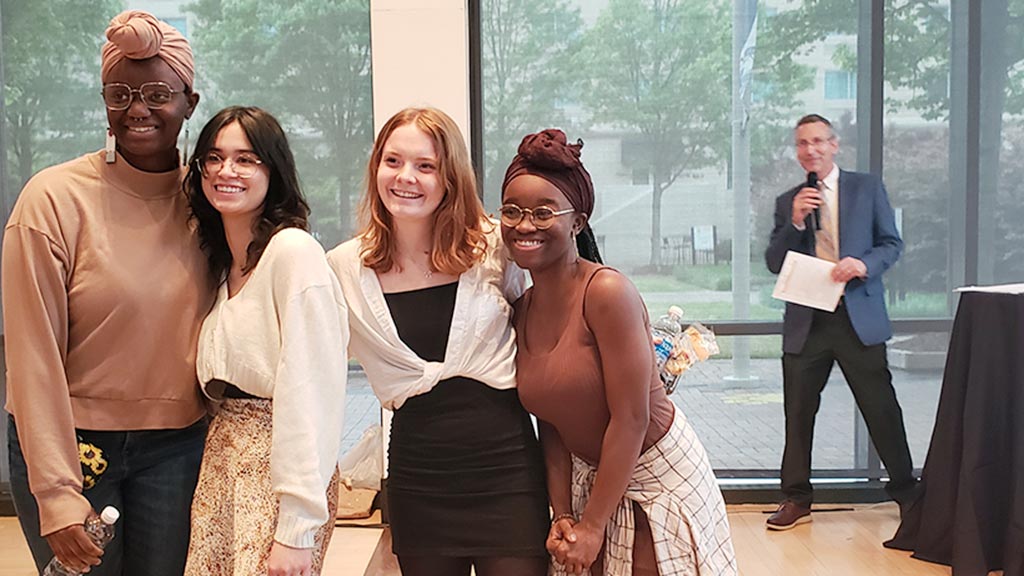
Statistics show that Hispanics are underrepresented in managerial and professional jobs across the United States. In Los Angeles, nearly two-thirds of all restaurant workers are Hispanic, yet most are concentrated in lower-wage positions such as dishwashing. “While we can’t change these numbers by ourselves, we are able to spread the knowledge that we have gained,” said Doane, Merrick, Augustin and Larkins.
The group planned to attend the April 2023 Asheville Bread Festival to present the nutritional benefits of using whole grains in traditional Hispanic cuisine, preparing a bilingual hands-on demo to focus on using whole grains for its nutritional value and flavor incentives as applied in bread and pastry production. “We will be making things like conchas and laminated dough products to show the use of whole grains in baking,” the group presented. “We want to help extend our knowledge of nutritional baking to Hispanic communities who might not have access to this information.”
Their hope: that people will gain an understanding of the use of whole grain in baking and can spread the word among their communities, spotlighting Hispanic contributions in the culinary world.
Encouraging Compassionate Healthcare for Vulnerable Populations
Identifying Links between Discrimination and Substance Abuse
Natalya Archibald, a Health Science major who hopes to be a pediatrician or general practitioner after graduating JWU in Fall 2023, presented on her study of substance misuse among sexual and gender minorities (SGMs). “This population often deals with discrimination that can result in maladaptive coping like substance misuse,” Archibald explained, “Yet few studies have examined the association between everyday discrimination and various types of substance misuse among SGMs.”
Samantha Rosenthal, Ph.D., M.P.H.; Kelsey A. Gately, B.A., OT/S; Allyson B. Baker, B.A., OT/S; Monique P. Dawes, O.T.D., OTR/L, CPAM and Jennifer E. Swanberg, Ph.D., M.M.H.S., OTR/L co-contributed to the project, and Archibald said she learned much from Associate Professor Rosenthal about researching populations while collecting data from 1,316 adult SGMs across the U.S.
“I want to be better informed so I can provide the best care,” Archibald explained. “I didn’t know that substance abuse among discriminated populations was such a problem until this study. I want to help, and I want to start something that other doctors will follow.”
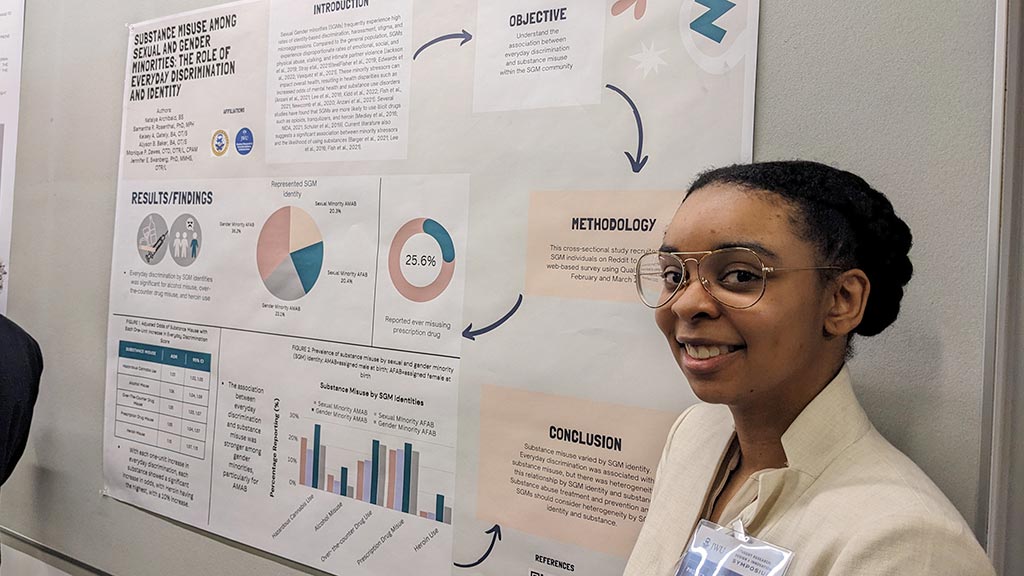
Discrimination interactions were found to be significant for alcohol misuse, over-the-counter drug misuse and heroin use, with the association between everyday discrimination and substance misuse stronger among gender minorities. The conclusion: substance abuse treatment and prevention should consider heterogeneity by SGM identity and substance.
“I think there is some mistrust among patient populations of healthcare professionals,” Archibald explained. “We need to let them know we’re listening. We need to show care through how we talk, through what body language we use.”
“I want other doctors to follow the lead on providing compassionate care,” she continued. “This study was one way of taking data, discovering something about our patients, and using that new knowledge to change the system.”
Creating Environmentally Sustainable Venues
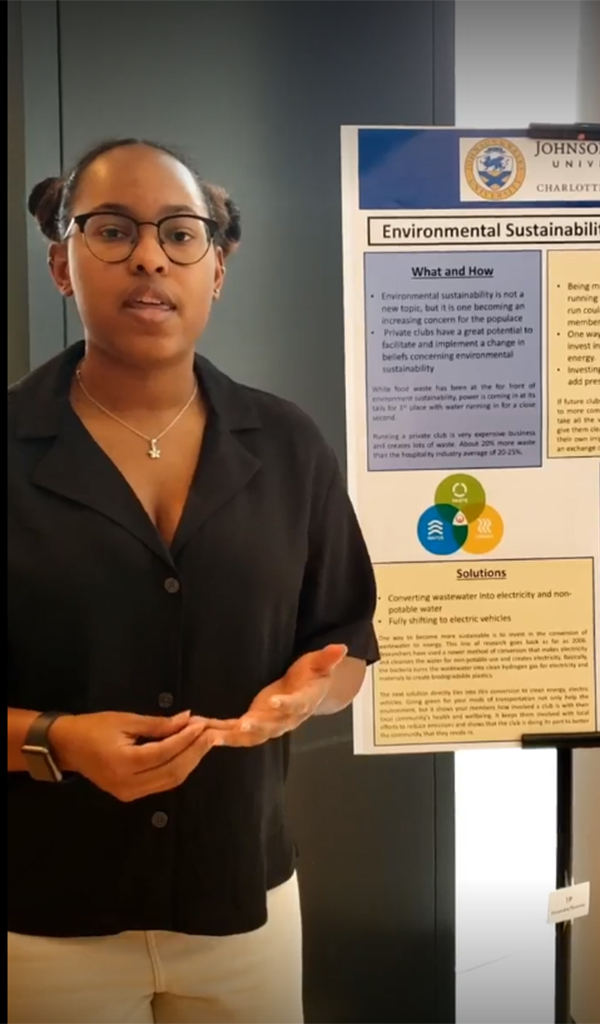
Alexandra Plummer '23 explains her study on environmental
sustainability in private clubs.
Alexandra Plummer ’23, a Food & Beverage Industry Management major at JWU’s Charlotte Campus, presented on environmental sustainability in private clubs, focusing on converting wastewater to energy. She learned from research that each golf hole required an estimate of 139 gallons of water per day in Las Vegas, which added up to 2,507 gallons of water for 18 holes per day.
“Private clubs must find ways to meet the needs and expectations of the newer generations of members, without betraying the standards of service and expectations of their current members,” she said. One way to become more sustainable is to invest in converting wastewater to energy, a line of research dating back to 2005, when scientists were first realizing potential in using the microbes of decaying human waste to create electricity. “A microbial fuel cell provides electrical energy using microorganisms as biocatalysts and organic materials as food for the organisms. Basically, the fuel cell is a battery that uses bacteria to create energy,” Plummer explained.
She was excited by a University of Washington study that used a fuel cell with two electrodes to create organic material. “After it passes through, that water, although non-potable, can be reused for things like irrigation,” she said. “The first electrode, by trapping organic material, encourages bacteria growth, which releases electrons that are captured by the secondary electrode and are made into electricity. That electricity can be used for anything, from powering golf carts to running the whole clubhouse.”
What are the benefits of her research? “There will be challenges and obstacles that the clubs of the future will face, ones that may take years to fully overcome, but concern for the state of our planet is something that won’t go away anytime soon,” Plummer said. “If private clubs can be more environmentally sustainable and show profit and positive results from a shift in culture, then they maybe be able to convince their members that clean energy and investing in sustainability is an endeavor that benefits all those involved.”
A Nurturing Opportunity for Dementia Patients
Lisa Benson ’23, an Occupational Therapy Doctorate (OTD) student on JWU’s Providence Campus, wanted to help adults with dementia, so she focused on designing and implementing robotic animal interventions for that population. “I love working with mental health patients, but dementia is something I wouldn’t wish on my worst enemy,” she shared of the devastating disease. “But until there’s a cure, there is care, and you can live a meaningful life.”
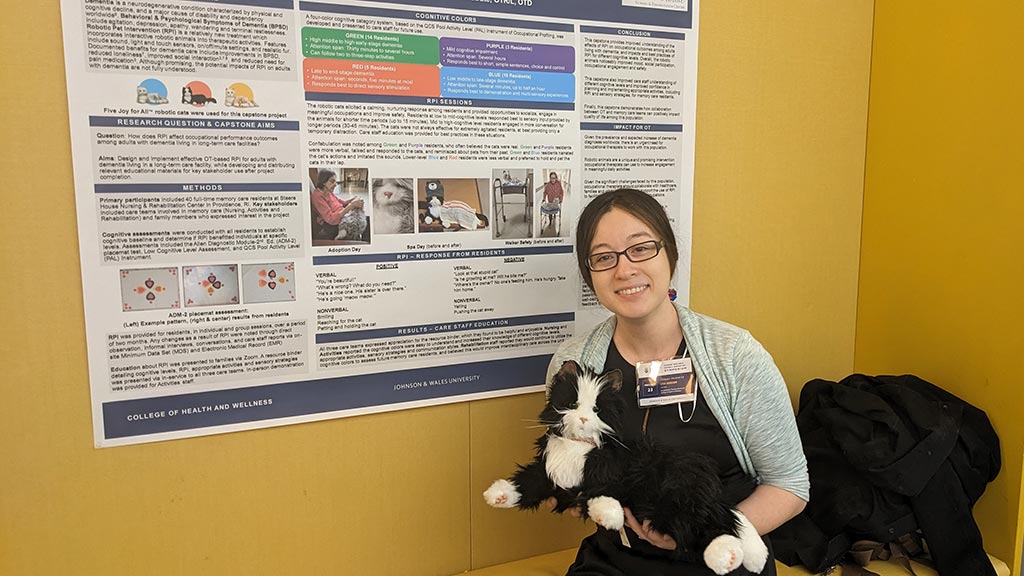
Benson explained how robotic pet intervention is an emerging technique for caring for people with dementia. At JWU, she was able to examine its impact on local memory care residents. The robotic kitties she purchased emulated the softness and playfulness of real animals, with weight, movement such as rolling over, and tactile fur. “You could see residents’ eyes light up when they interacted with the robotic pets,” Benson shares. “It brought out a nurturing response, allowing them the empowerment of taking care of something small.”
She shared how one resident with a fall history had refused to use a walker. Once she was given her own robotic pet, the patient’s demeanor changed. Benson’s team added a basket to her walker, and the resident loved traveling around with her “pet” on board.
As for Benson, she loves how JWU’s OTD program prepared her for anything using what she dubs her “OTD brain.” The program is “where science, creativity and compassion collide,” she said. Her favorite moments at JWU had included collaborations with students in other programs, such as with culinary students on a competition to create healthy mac & cheese recipes or with design students on designing an accessible coffee shop.
“As OTD students, we’re equipped to work with anyone, and we knew the ins and outs of what makes a space accessible. But the design students were able to bring the technical know-how to make it happen.”
Elevating Health in Hospitality
Hospitality Management major Ashley Zechello ’24 not only enjoyed the experience of interning at the private club in Brookline, Massachusetts where she now works as an employee — she used the opportunity to conduct a study exploring the value of health within the industry. Zechello examined innovative approaches to wellness from the perspectives of employee health, member health, community health and environmental health. She found that clubs that empower and invest in employees, focus on fitness centers and healthy food, support local businesses and towns to be part of something larger than the organization itself, and emphasize the importance of being sustainable were more successful. Her study is being published in Club Management magazine, where she hopes it will inspire others to consider health.
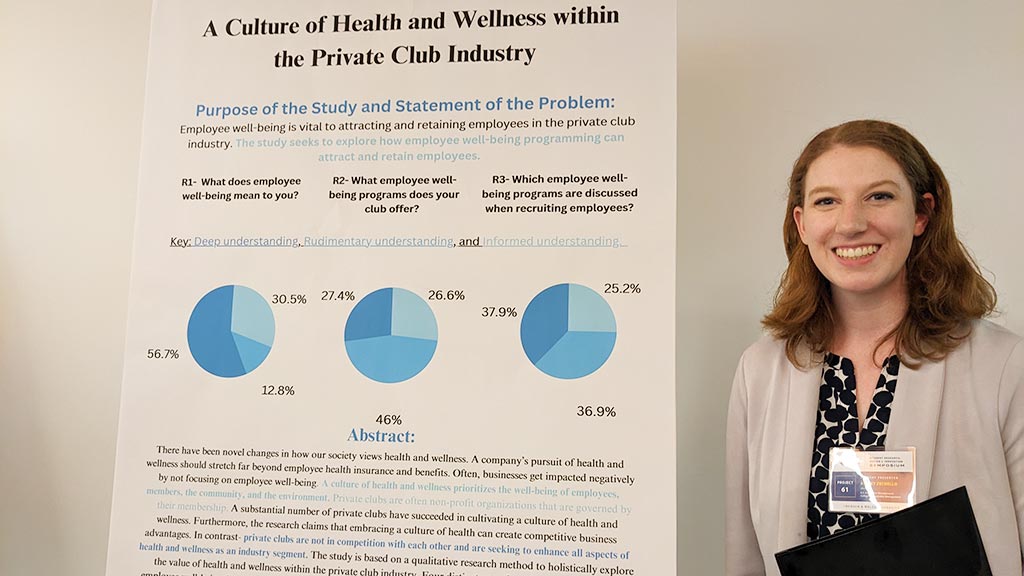
“To get people to participate, I posted surveys on LinkedIn, I created a QR code that I handed out in cards and flyers — I even crated a podcast,” Zechello said. “People were great about participating!” She added that the pandemic created hardships for the club industry, but it also deepened the value of wellness and outreach to the community, a trend she hopes to see not only continue but spread to other industries.
Zechello, who in 2021 was selected to participate in JWU’s Emerging Leader certificate program, is still using the skills she developed in that program to positively influence the community. “I’m constantly doing little things to help the team at my club,” she said. “Even just leading a five-minute meditation is starting to change people’s mindset. It’s amazing to see.”
Visualizing a Food Experience
Erika Morais ’23 and fellow Graphic Design students Alyssa Audino, Evander Gomes, Tabitha Booher, Farrah Phelps, Stela Carneiro and Bella Nolan worked with a team of Providence Campus culinary students, dubbed “Growing for the Menu,” to establish a vision and aesthetic surrounding the dishes served at Growing for the Menu’s pop-up culinary event.
“The team supplied delicious dishes on the theme of the Three Sisters,” explained Morais, referencing the Native American tradition of planting corn, beans and squash together because they grew in harmony, nurturing each other like family. “We opted for an autumnal, rustic feel in our branding, as it was in line with the season. We used warmer browns, reds and oranges, taking inspiration from the changing leaves.” As she showed off the menu, digital flyer, informational cards and table cards created for Growing for the Menu, Morais shared that she had learned how to use programs such as InDesign at JWU to create the invitations and other pieces.
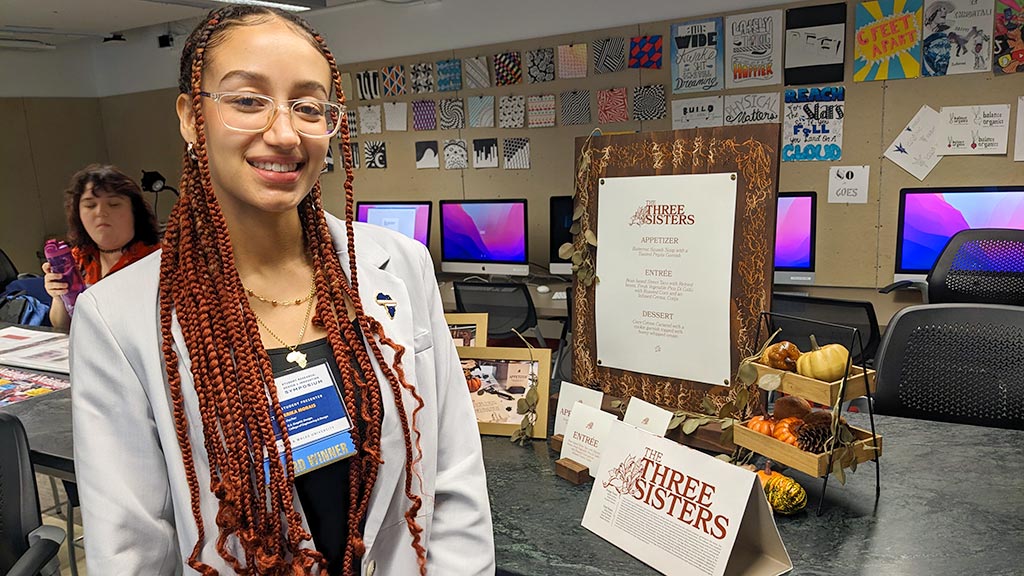
Initially, Morais had only heard of Johnson & Wales because a family member had attended, but then she visited JWU Providence in high school and knew where she belonged. “I loved the energy — JWU stood out among other schools,” said the senior, who planned on moving to St. Martin after commencement to create visual projects through photography and videography for a print-based company. “And the design professors here at JWU are the best you could have!”
Keeping the Cyberworld Safe
Cybersecurity major Kyle Leupold ’23 presented on his experience participating in the Colorado Cyber Games. The four-week competition was hosted in October 2022 by the Colorado Cyber Resource Center (CCRC to allow competitors to showcase their skills in front of employers. The four weekly challenges included multiple modules and progressively increased in difficulty as the month went on. Competitors had no prior knowledge of the tasks, requirements or virtual environments they would face, and the winner of each respective challenge was determined by the time it took them to complete all the modules involved.
Despite having no competition experience, Leupold took first place in three out of the four challenges, winning the overall Cyber Games despite facing competitors with far greater industry experience. How did he do it? “I didn’t expect to win, actually; I just wanted to try out the skills I learned at JWU,” he said. “To my surprise, the competition’s challenges felt easy, because they were things we had already done in labs at Johnson & Wales.”
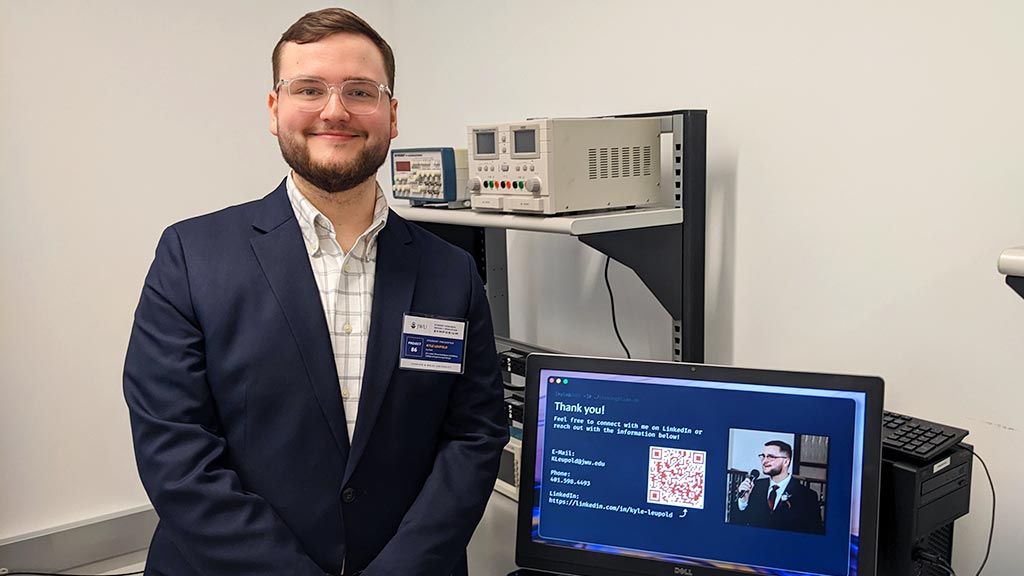
One perk from winning the Colorado Cyber Games was how many employers have reached out to Leupold, who at the time of the symposium had not yet graduated and was still weighing his options. “Employers really like that I took initiative outside of class, and I’ve had some great interviews, including with SpaceX,” Leupold said. “Assistant Professor Chavis really brought in hands-on learning and was always there for his students if we had any questions. Everything he taught helped prepare me for the Cyber Games and beyond.”
Leupold cited an example of a perimeter protection split exercise in class, where students on red and blue teams either attacked or defended the server. “There were lots of variables to track,” he said. “It was an exercise, but one that was just like I’d see in the real world.”
Promoting Voting Rights Advocacy
Hospitality Management majors Grace Conner ’26 and Whitley Jones ’26 presented on their work with the Charlotte Racial Justice Consortium (CRJC), a partnership between JWU’s Charlotte Campus, Central Piedmont Community College, Johnson C. Smith University, Queens University of Charlotte, and the University of North Carolina at Charlotte. This is the CRJC’s third year in existence.
“The CRJC shares a vision of a Charlotte community that understands its history of race and racism, embraces a more comprehensive narrative on race, eliminates a hierarchy of human value, and develops faculty, staff, and student leaders who advocate across our five campuses and the community for truth, justice, racial healing, and systemic transformation,” Conner and Jones explained. “As part of the CRJC Fellows program, each campus cohort is expected to present our campus project as part of the overall consortium project.”
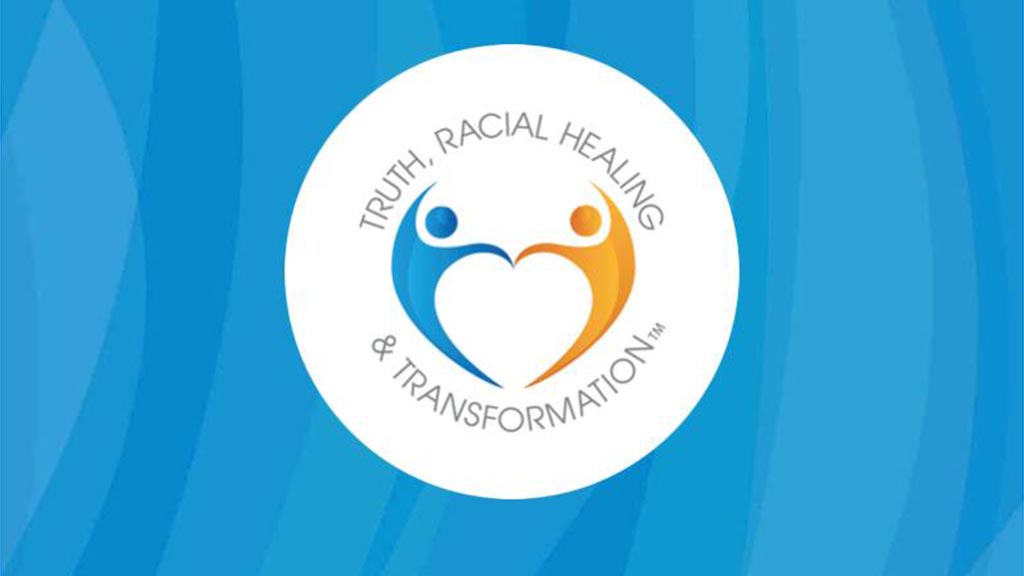
Conner and Jones were preparing to present at CPCC, with this year’s The CRJC Fellows Project topic being Voting Rights Advocacy and using the Ladder of Social Justice and Social Change. The pair chose Education as their focus for JWU. Connor and Jones invited JWU students to view the film “Selma” and to discuss the importance of having a voice through voting.
They also invited guests from Common Cause, Charlotte City Council, and the Brooklyn Collective (among others) to talk about the organizations they belong to in order to encourage students to be active, voting citizens and to understand the consequences of not being heard.
In addition to showcasing their work via PowerPoint to symposium participants, Conner and Jones provided a survey for students to complete about voting and registration. They also shared opportunities to join the CRJC/JWU Fellows in Voting Rights Advocacy events during the 2023-2024 academic year.
An Artful Experience for Diners
Symposium attendees on JWU’s Providence Campus flocked to the black-clad group of culinary students calling themselves Gratame (pronounced grah-tah-may) expertly swishing back and forth serving eye-catching samples. For their capstone lab, Culinary Arts students Kaitlyn Driscoll ‘23, Nhat Pham ‘24, Ammar Garib ‘24, Kim Hyoungwuk ‘23 and Marian Liu ‘24 conceptualized a Beverly Hills-located fine dining restaurant that celebrated food as art.
“Gratame takes the Latin translations of ‘gratis,’ which means free, and ‘ame,’ which means soul,” explained Driscoll. “For centuries, food was treated as sustenance, and many people believed food only existed for survival. At Gratame, we aim to showcase food as if it were in an art gallery, with each dish handcrafted to create an unforgettable experience for our guests.”
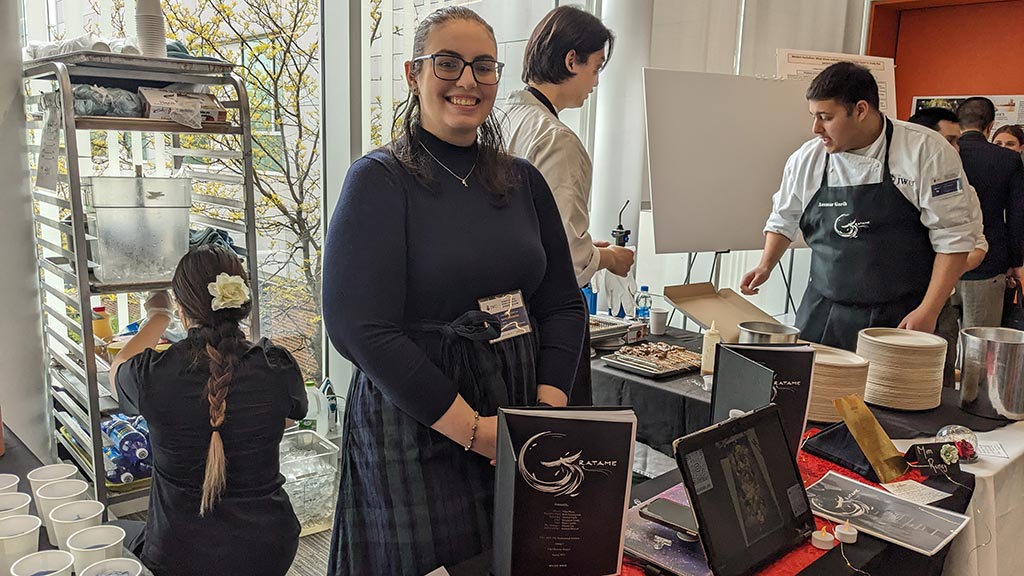
As she expertly combined honey lemonade, butterfly pea flour, an Asian fruit called longyean and club soda to turn blue liquid into a purple, smoking science experiment-like drink for delighted symposium attendees, she added, “Our theme with Gratame has been ‘no boundaries.’ We’ve held several pop-up meals, and it’s been amazing seeing our philosophy of food as art coming to life.”
Returning from helping other team members hand out delicious-looking lamb kebabs at the other end of Gramate’s pop-up dining environment, Liu added, “It’s been a labor of love. Our team had 12-hour meetings every other week to bring Gratame to life. It’s our baby.”
Improving Musical Instruments Sustainably
Mathew Hartung ’24 had studied mechanical engineering at Wentworth Institute Technology before becoming a high school engineering teacher in his hometown of Taunton, Massachusetts until a friend in JWU’s graduate program recommended Johnson & Wales. Hartung said he found JWU to be “the best educational experience I ever had.” After lauding the “energy” that JWU brings to education, the Product Design major continued, “You can’t beat the opportunities at JWU for students to participate. And the support is incredible! If you have questions, someone will have an answer.”
Hartung’s project attracted Providence Campus symposium attendees with the chords he was strumming — but this wasn’t a traditional guitar. Hartung, who has been a guitarist for 13 years, had identified a universal issue for recording artists: the need to own and haul around multiple guitars. “Each guitar produces a different tone and sound, which means that more guitars may be necessary to create the desired effect for a given song,” he explained. His creation, Infinity Guitars, is one guitar capable of sounding like every guitar by giving the electronic pickup (a hardwired component that receives and amplifies sound vibrations) the ability to be easily removed, swapped and combined with other pickups.
“This modular component allows a single guitar body to sound like any electric guitar the player wants,” he explained while showing off what he had created on a 3D printer in JWU’s Innovation Lab. “It can create a nearly unlimited number of new combinations of pickups to produce new tones.”
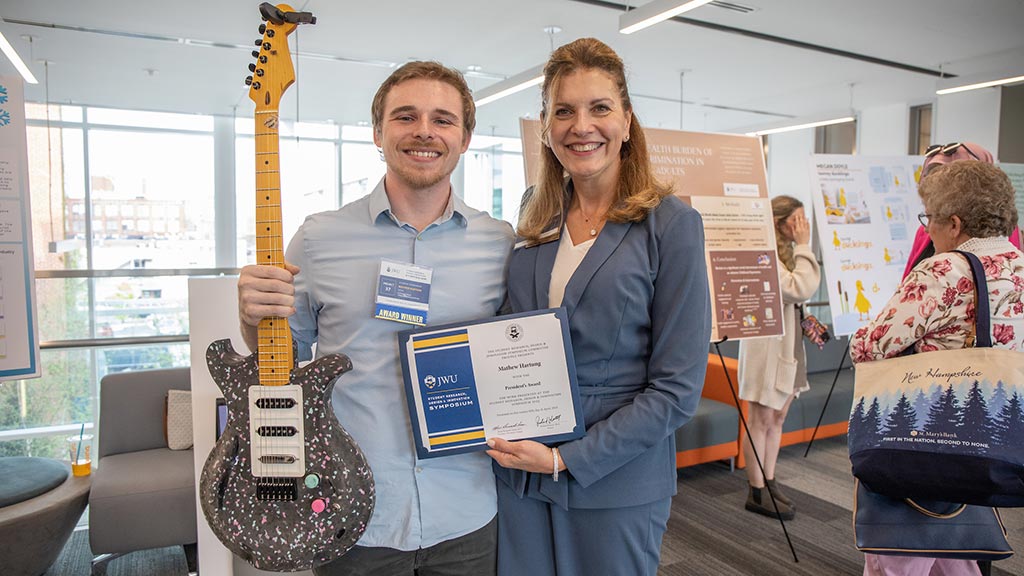
Like many JWU students, Hartung was concerned about sustainability. “Thousands of trees are cut down each year to make guitars, and then most of the wood is covered up with paint and lacquers that hide the base material underneath,” he lamented. Instead, in his prototype, the guitar body is made of 100% recycled and recyclable plastic, which won’t affect the tone of the instrument. Each guitar will be made with unique patterns from the plastics used to produce the body.
To make his Infinity Guitar, Hartung used 112,000 fuse beads (small plastic dots used to create images in crafting), melted them into a block, and then cut the guitar body out of the block. Of Hartung’s project receiving an award, he stated, “It feels fantastic to have my hard work appreciated! Hopefully the idea can spread to other people who will also work on improving instruments.”
Creating a Service and Employment Opportunity
Culinary Nutrition majors Edwin Pereira ’24 and Anya Glessman ’24 focused their project on incorporating an additional revenue stream into Weinberg Village, a facility for Jewish older adults that focuses on memory care. The Charlotte Campus students added a coffee kiosk to the facility, offering a diverse and locally-sourced menu. Drink selections ranged from tea to smoothies, while baked goods included hamantaschen, a traditional Jewish dessert. “As the residents are members of the Jewish community, we had to ensure that we adhered to kosher guidelines,” said Pereira. “Our kosher menu is diverse enough to appeal not only to the residents but to their visiting families, which often include children.” They dubbed their kiosk Deja Brew, with the slogan, “Where have you bean all my life?”
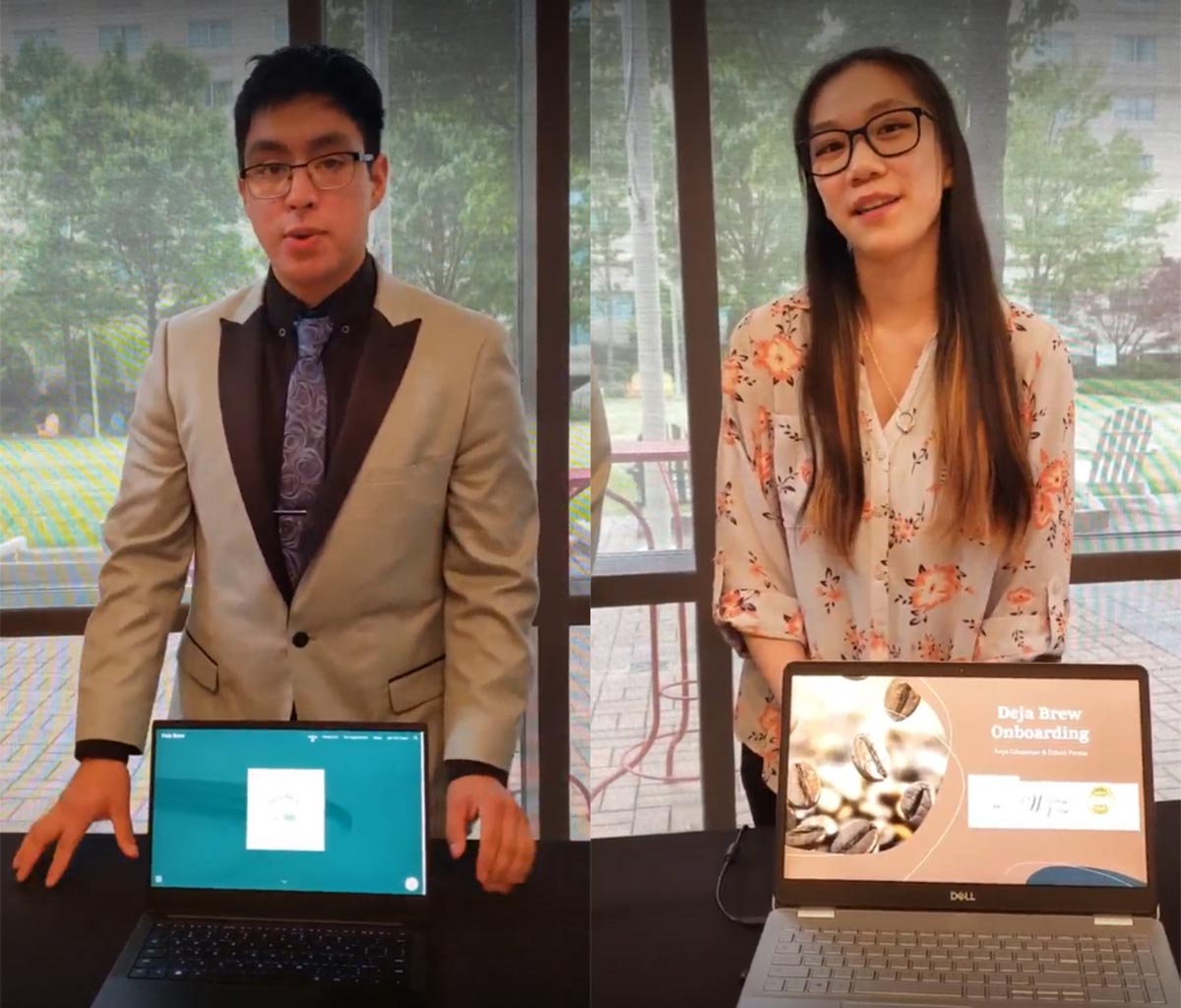
Coming up with a business idea, logo and slogan, as well as building a website for the business, was just part of their project, however; they also had to conduct a hiring process. “We created and filled two barista positions to operate the kiosk, and we created an onboarding training regimen for the hires,” explained Glessman while showing symposium attendees various pages on her laptop, from Deja Brew’s mission statement to a welcome video.
“We also have reviews, contact information, hours of operation, and a statement on our locally-sourced products along with a menu, prices and job information,” added Pereira.
Where have these entrepreneurial Wildcats “bean” all our lives?
Helping Fellow Students Be Their Best
Corporate Accounting and Financial Analysis majors Yen Tran ’23 and Vanessa Beke ’23 used the symposium as an opportunity to give insight on the Institute of Management Accountants (IMA) conference to other students and community members. Both women are officers in JWU Charlotte’s Accounting Society, Tran serving as president and Beke as vice president, and they used their project to inform students what the IMA is and provide insight into what happens at a conference. Further, they wanted teach other students how to prepare for a conference and how to secure an internship at an international conference, as well as providing expectations for presenting and for interviews.
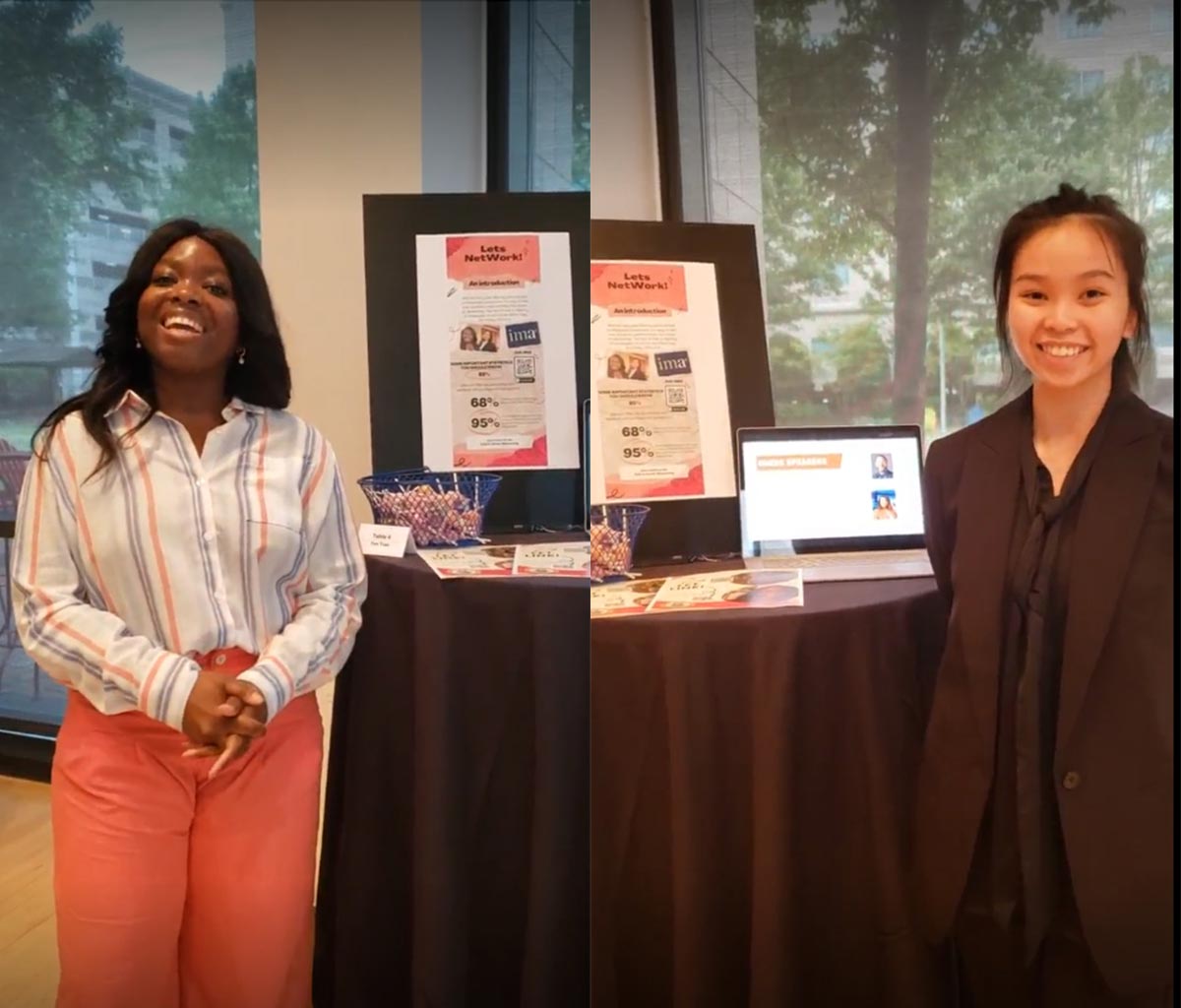
“Our presentation is all about life experiences that students will need in a professional environment,” said Beke, who is originally from the Ivory Coast. “There’s a lot you might not think about yet. It’s learning how to behave, how to dress well, how to stand out, how to build connections with vendors and other participants — skills that will help you further your future.” Beke was currently completing a management internship and learning best practices and business processes, so she was well-equipped to share her knowledge and address the question, “How can a question get you the world?”
“We just want you guys to better yourself,” said Tran, summarized their project's goal in just a few words. “For your future and your careers.”
Collaborating to Improve Mental Health
In another collaborative JWU project, Psychology majors Michaela Hawkins ’25 and Isabella Pitt ’24 teamed up with Food & Beverage Industry Management major Julie Tran ’23 to showcase different ways to improve mental health using a combination of scholarship, counseling and survey analysis.
Amidst a culture of overreliance on prescription antidepressants, Duke University conducted a landmark study in 1999 in which antidepressants were compared against cardiovascular exercise as a viable treatment for reducing depressive symptoms. After 16 weeks, participants showed significant and comparable symptom reduction. However, after extending the study for an additional six months before assessing relapse rates, the results were staggering: 38%of those in the antidepressant group experienced significant relapse of depressive symptoms, while 31% of the combination group experienced relapse as well. Yet only 8% of those in the exercise-only group experienced such relapse.
“This provides suggestive evidence that exercise is as good as antidepressant medication in the short run, but far better in the long run,” said Hawkins, Pitt and Tran. “It also suggests that antidepressant medication seems to dampen the therapeutic effectiveness of exercise as demonstrated by the 31% relapse rate of the combination group.”
The trio presented these results along with findings from the 2022 Center for Collegiate Mental Health annual report, which provided helpful data on the positive effects on counseling services on mental health and retention. They also conducted a survey of JWU students on depression and exercise, presenting those results in their poster as well.
Tran, who was about to graduate at the time of the symposium, hoped to take the skills she gained through internships and volunteering to open a family restaurant someday. Pitt, who has a special interest in mental health advocacy, is an aspiring entrepreneur. Hawkins was profiled by a fellow Psychology major, Keyanna Metts, in a JWU news article after winning an individual national title in women’s golf for JWU last fall.
Making Their Mark on the World
Graphic Design students have ample opportunities to discover their style and perfect their skills at JWU, and several students in the symposium showcased portfolios of beautiful, professional-looking work.
Rethinking the Design Process
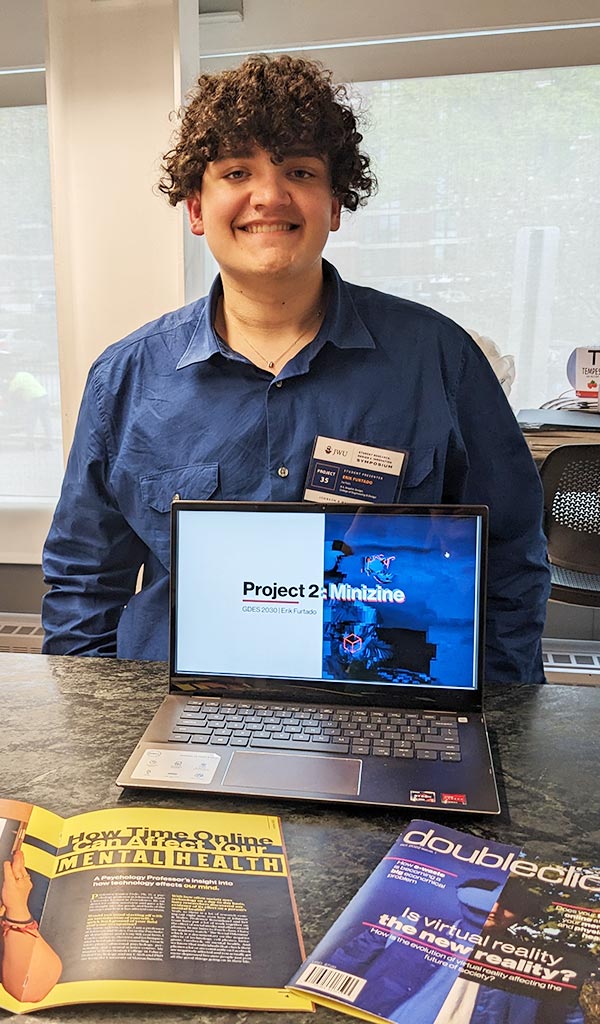
Take Erik Furtado ’24, who presented on rethinking the process to design a compelling editorial publication. Furtado’s conceptual magazine, Doubleclick, focused on the effects of technology on people’s lives. He created all articles and imagery using a combination of InDesign, Illustrator and Photoshop, while his unique fold-out construction created an interactive experience for the reader.
Furtado needed technical software skill to create a successful solution to the overarching complex design problems that multipage publication design presents. Doubleclick required refining the approach, and Furtado was proud to share how impressed people were with his design and construction; his cover design won best in his class on JWU’s Providence Campus. “I appreciated the opportunity to adapt and evolve to create this publication,” he said.
Although he was just finishing up his sophomore year at JWU, because he participated in a Running State program in high school, Furtado aims to graduate JWU a year early in 2024. “I want to be a graphic designer and work with branding,” he shared of his dream job.
He is certainly off to a good start!
Using Creativity to Increase Pet Adoptions
Meanwhile, Graphic Design major Alyssa Audino ’23 had been tasked at JWU with creating and branding a conceptual company. An animal lover, Audino invented HeartPaws, which focused on connecting pets with their new “fur-ever” families. Her approach to pet adoption was an app that works with shelters across the nation to successfully match animals with owners. Her concept would create more visibility outside the shelter to increase chances of adoption, especially for smaller shelters that don’t have a large social media presence.
“I had to have a great interface design and layout to create an aesthetically pleasing and functional app, plus intuitive navigation,” Audino explained, “Plus there are plenty of pet pictures! This project is near and dear to my heart because the photos are of my own pets and those of friends and family members.”
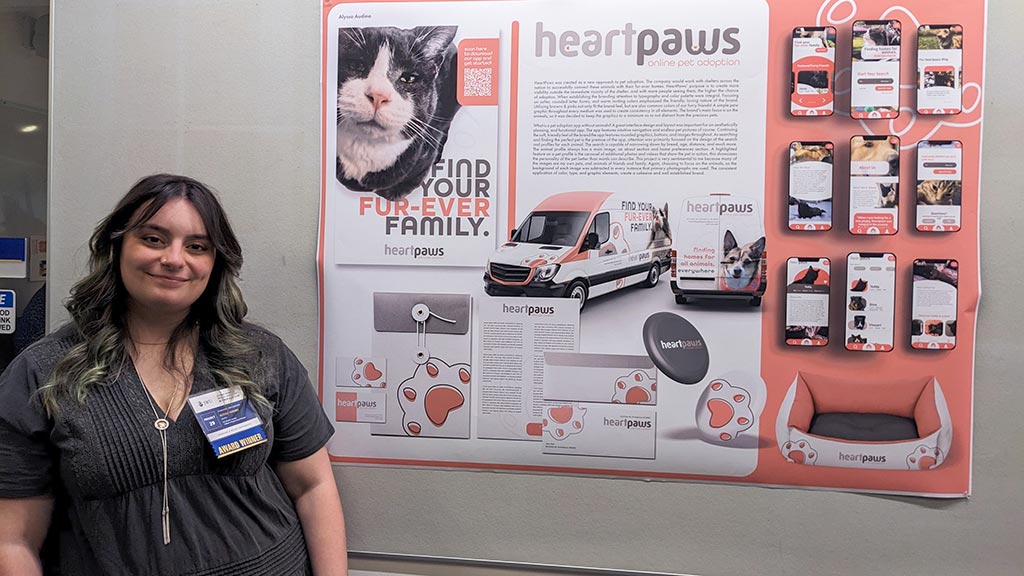
Audino focused on the design of the app and its pet profiles, imagining a search function capable of narrowing down by breed, age, distance and more. “It’s all conceptual right now, but I would love for this to be real,” she said. “There are pet websites out there, but there’s definitely a place in the market for an app with accessibility and easy navigation.”
In addition to designing Heartpaws (one of the Providence Campus award-winning projects), Audino interned while at JWU and discovered just how hands-on the experience could be. “It’s not just busy work,” she said of her internship.
“I’ve loved the experience of branding for a community care alliance,” she said. “My intern supervisors are great, and several went to or taught at JWU! Everyone has been so friendly. They know what Wildcats are capable of, and they matched us to our strengths.”
Highlighting Individuality in Graphic Design
Gloria Medeiros ’25 presented her class project of creating a fictional eight-page magazine, Anterior, including a front cover, article and interview spreads, a creative piece and a JWU advertisement on the back cover. “I’m a huge fan of the ‘80s,” Medeiros revealed. “I feel like it’s my entire personality.” Her 1980s nostalgia magazine focused on music, pop culture and technology and used flashy colors and angular lockups and details. “I researched a ton for this project by looking through countless writings, videos, and ‘80s content to add authenticity to the spreads,” she revealed. Pointing to one spread, she noted, “I wrote this fictional interview on Duran Duran because they’re my favorite band!”
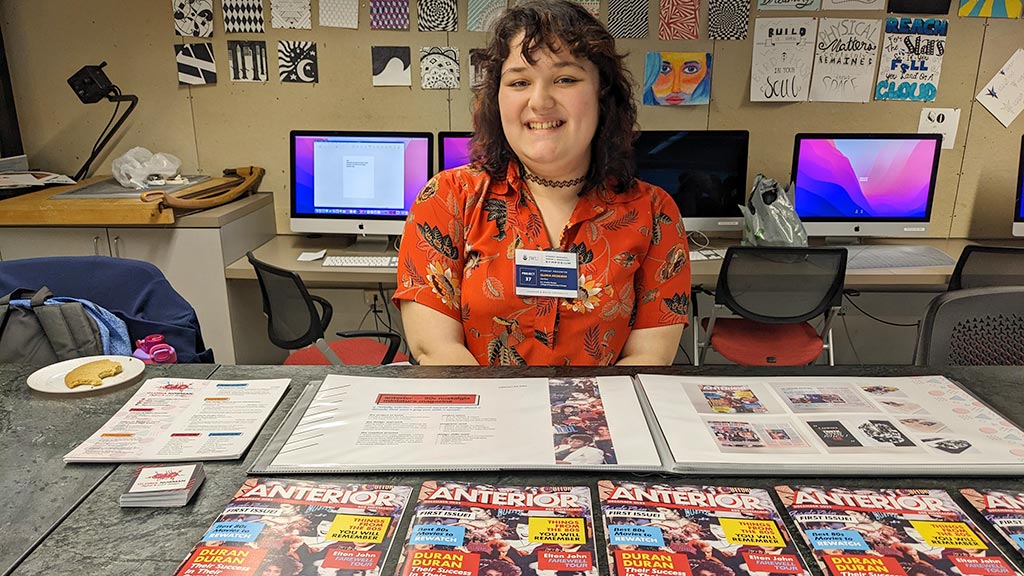
If employers have a chance to check out Medeiros’ résumé, it’s every bit as fun and colorful as her nostalgia magazine.
Incorporating Pop Culture in Package Design
Matt Scheetz ’24 similarly used the JWU Graphic Design project of conceptualizing, designing and branding a hypothetical company to show his love of something nostalgic. “I designed it to present an ‘80s style but with modern-day elements,” he explained of his conceptual beverage packaging company, Thirsty Burst. “It was important to remain professional but be creative, and I made some fun elements to separate Thirsty Burst’s drinks from the other brands.” He noticed in his research how big mascots had been in the ‘80s and carried over that spirit using Super Mario Brothers to illustrate conceptual flavors such as Mango Mario and Luigi Limeade, creating the die cuts for Thirsty Burst’s water explosions by hand and giving a nod to Nintendo’s recent 35th anniversary of Super Mario Brothers with a limited-edition set of packaging.
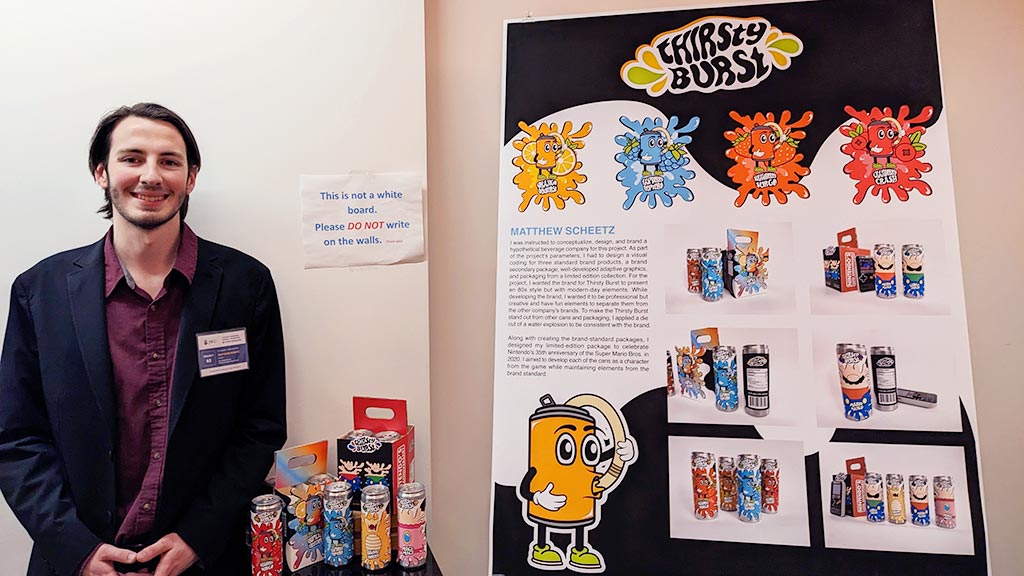
“Print and logo design is my passion, so it was great to have this class give me packaging design experience,” he said.
Scheetz continues gaining professional design experience as a student employee for JWU University Marketing, spending the summer based on the Providence Campus helping to design materials for Admissions and other JWU departments.
Reducing Food Waste
Repurposing Food with New Recipes
Applied Food Science major Marshall Davis ‘25, who obtained his A.S. in Culinary Arts from JWU as well, was one of several JWU students who participated in a challenge at The New York Produce Show, an annual convention that discusses and educates attendees about new innovations and networking, at the Javits Center in New York in December 2022. The challenge focused on produce to showcase the capabilities of the students and the convention members’ products, and the current challenge was to minimize food waste.
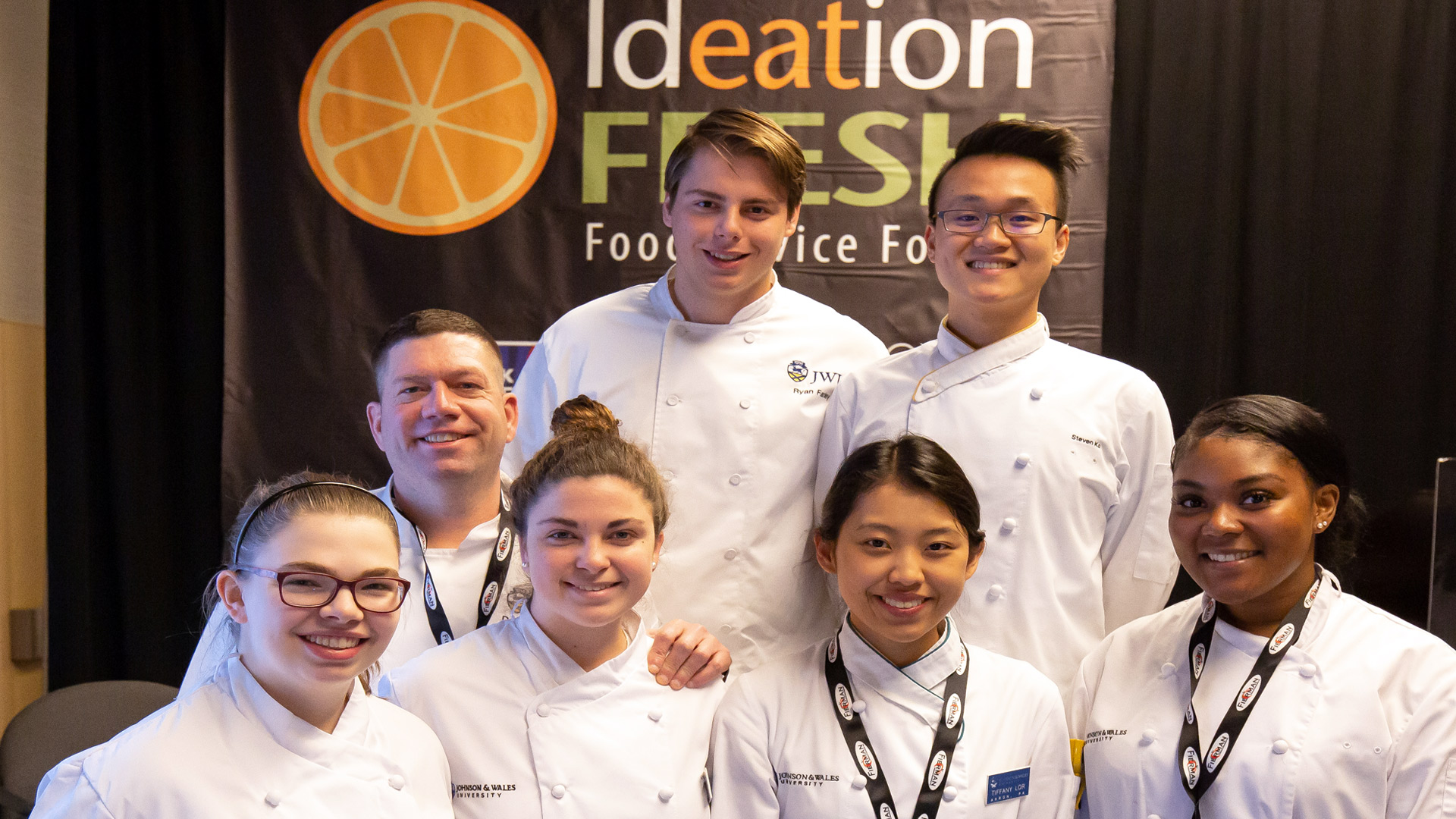
“Waste is an alarming issue within the food industry, which contributes to the emissions of greenhouse gases and significant waste of resources,” reported Davis. “My team and I proved that food waste can be minimalized with cross-utilization and maximizing the utility of all aspects of production.”
The JWU team researched techniques for repurposing the produce and discovering recipes, ultimately finding that the majority of the products could be utilized in a purposeful manner. “We then determined ingredients and menu choices that would keep our waste at minimal levels,” Davis said. “This showcase will allow others to understand that there is more food that can be conserved and utilized in a culinary sense.”
The food Davis and teammates prepared for the produce show consisted of a banana peel "pulled pork" with a Brussels sprout slaw on a piece of Bibb lettuce. Their entree consisted of a deconstructed vegetarian moussaka. Lastly, their dessert was a no-bake banana and basil tart.
The Importance of Fermentation to Combat Food Waste
Davis also shared results at the symposium of a study he conducted in his Fermentation Science & Functional Foods course at JWU. Concerned about the negative global impact of waste from byproducts of restaurants and juice plants, Davis collected numerical and qualitative data to test the fermentable capabilities of the different parts of a watermelon (rind, flesh, and skin) and the organoleptic qualities of each after the process was assessed. He inoculated the watermelon sections with lactic acid bacteria and vacuum-sealed them to produce an anaerobic environment to activate the fermentation process at room temperature.
At the end of the semester, the resulting products expressed a change in color, texture, and taste, and his research suggested that every aspect of the watermelon can be utilized as a food source. “Explorations in understanding the organoleptic qualities of food by-products that are normally considered waste, under different processes, can encourage others in the food industry — both chefs and manufacturers — to be more creative with products while minimizing or eliminating food waste,” Davis determined.
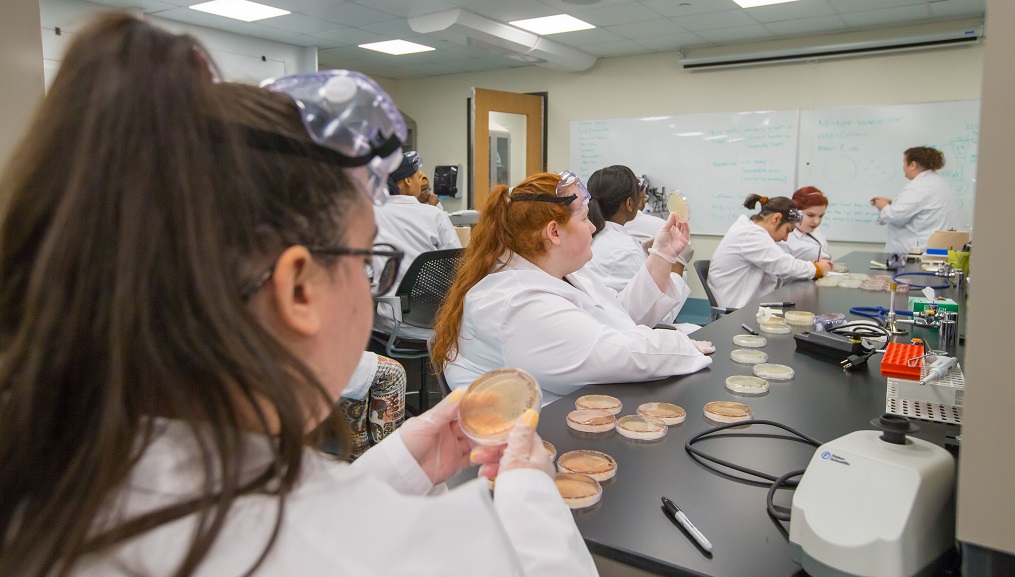
Applied Food Science major Allison Casper ’23, who had earned her A.S. in Baking & Pastry Arts from JWU, presented on her study of kimchi fermentation rates utilizing savoy (round) and napa (oblong) varieties of cabbage. Over nearly two months, Casper observed and recorded the fermentation rate of napa and savoy cabbages, which are both known for their sweet, mild tastes and tender textures, testing the rates with a Mettler-Toledo benchtop pH meter in order to track the creation of lactic acid.
“This experiment yielded reasonable results, showing that savoy cabbage, due to its makeup, ferments slower than napa cabbage,” aspiring food researcher and developer Casper presented. “Both, however, achieved the desired fermented taste that is expected of a good kimchi,” she concluded.
Casper’s and Davis’ research are important contributions to food, as fermenting fruits and vegetables can extend their shelf life, preserving freshness while exalting flavors and reducing food waste.
Evaluating a JWU Education’s Effectiveness
Isabella Gonzalez ’24, a Food & Beverage Industry Management major, focused her project on how well school prepares students. She used her experience interning at La Belle Helene, a refined French brasserie located less than a mile from JWU’s Charlotte Campus. “I was attracted to the company because of its high caliber of food and clientele,” she explained, “So my career advisor helped to establish the initial contact with their executive chef.”
Gonzalez had no prior work experience in a kitchen, but she theorized that her education prepared her for what she might encounter. “My impression of La Belle Helene was that they wanted a motivated and professional employee who would fit into their small team but also be able to function independently,” she said.
During her internship, Gonzalez faced anywhere from 70-320 dinner service covers a night, and she was responsible for leaving a memorable final impression for guests at the end of their meal. “Nearly all our desserts are a multi-day process and require proper planning and execution in a timely manner — skills I learned in my Plated Dessert Lab 1730,” she said. “I was already familiar with many of the recipes they used and their method of prep thanks to my Advanced Pastry Applications Lab 2710. Plus, JWU’s Artisan Bread labs 1730/40 were applicable, as the restaurant produced all of its bread in-house.”
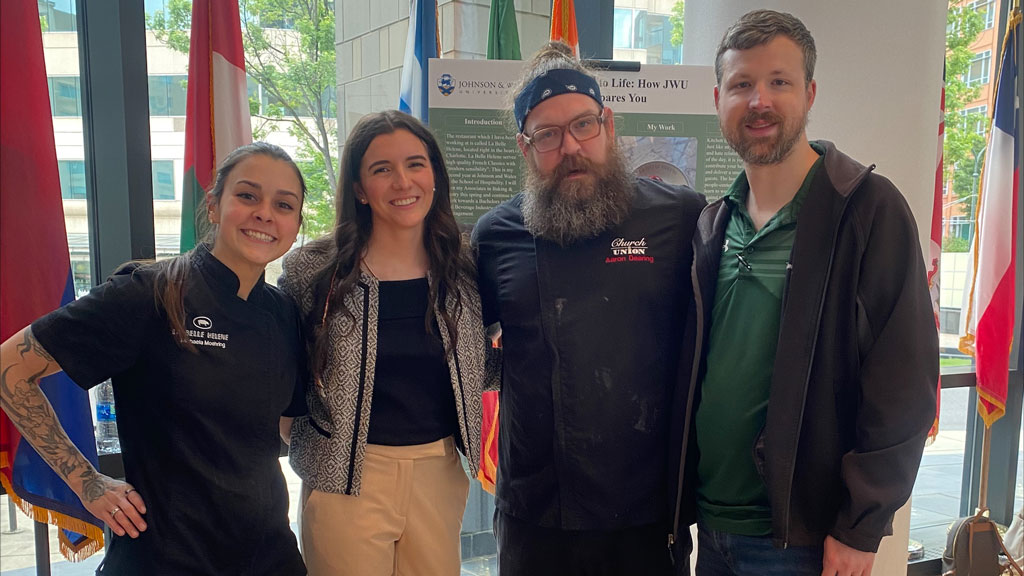
“I have not once felt lacking,” Gonzalez said of her fine dining experiences. “My head chef has allowed me to assist in the development of recipes, and I have grown in confidence. This whole experience made me realize that it’s worth the education that I’m receiving here, and it’s been really amazing to see everything applied into my real life.”
Monitoring Environmental Impacts in Nature
Juliane Bravo-Perez ’23 showed symposium attendees slides illustrating months of research undertaken by her and fellow Biology major Devon Gravel ’23 at four salt marshes. She and Gravel investigated nutrient resorption, a nutrient conservation mechanism used by deciduous plants, in a salt marsh perennial called Iva frutescens. Their study addressed the impact of nutrient resorption on the fitness and growth in the model organism, and they collected seed material and growth measurements from 10 replicate plants at multiple habitats along Narragansett Bay in Rhode Island. “We dried the seed material we collected, manually sorted them to purify seed sample, and weighed them. In addition, we counted and weighed a subsample of 100 seeds from five individuals from each sample site to determine whether significant seed mass variation existed among individuals or among habitats,” Bravo-Perez explained.
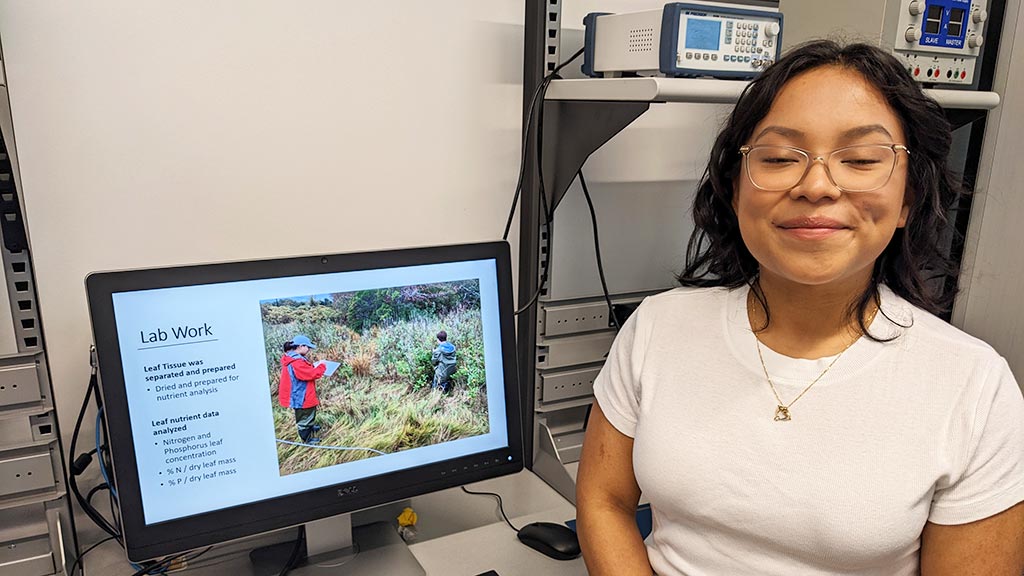
The project is ongoing, so seed samples from Fall 2022 and Spring 2023 will continue to be processed in Fall 2023, while seed production and vegetative growth in Iva frutescens will continue being analyzed. “These data, and future comparative analyses, will significantly add to the literature on nutrient resorption and its impacts on Iva frutescens’ fitness and growth — and that of plant nutrient conservation,” said Bravo-Perez. “We’re determining what will help this plant survive so that if we ever need to preserve it from a hurricane or other natural disaster, we’ll have identified the key to its survival.”
Bravo-Perez chose JWU for its labs and small classes but found something even better after enrolling: the faculty. “They were all so great — especially Professor Rosler and Professor Dimos. I jokingly call them ‘Mom’ and ‘Dad’ because they’ve been so kind. They really get to know you and do all they can to help you.”
What advice might the graduating senior have for others in the (no pun intended) field? “The rigor of the courses taught me not to give up, so my advice would be to always try,” said Bravo-Perez.
“Also, coming from Jupiter, Florida, this was my first experience with a salt marsh, and I got to get out there and be outdoors. So I would say, embrace opportunities to get out there and do something.”
Faculty Perspective on Student Research, Innovation and Design
The student presenters expressed how great it was to be able to show off their work with audiences, but what did faculty think of the symposium?
In a Word, "Fabulous"
In a word, the event was “fabulous,” according to Associate Professor of Health and Wellness Samantha Rosenthal. “The halls were packed. The student presenters were exuding confidence and enthusiasm in sharing their work with the public, and faculty were beaming with pride,” she said. Rosenthal added: “External partners were impressed with all that JWU does, and families were so proud to see their Wildcats showcased in such a meaningful way.”
Rosenthal came up with the idea for the symposium as a perfect opportunity for people in the community, including future employers and future students, to be at JWU and be involved, and she headed the Providence Campus symposium committee. Although excited by student work in every discipline, she did share some highlights. “I really loved how creative the culinary student projects got with food. And I’m impressed with the number of products that were able to incorporate social justice and diversity, equity and inclusion, too.”
JWU Center for Academic & Career Excellence Executive Director Timothy Stiles served on the Charlotte Campus symposium committee. “This was a terrific end-of-the-year celebration of ‘all things experiential’ at JWU,” said Stiles. “It was great to see so many students, faculty and staff who showed up to listen to student presenters. I am hoping this inspires other students to pursue some of these enriching and high-impact experiences.”
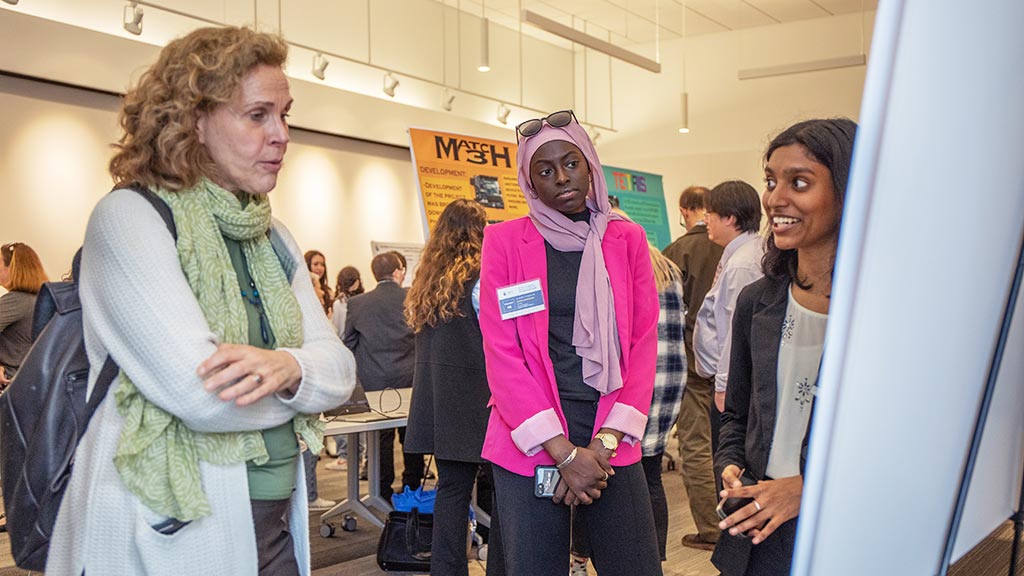
Associate Professor of Hospitality Management Sophitmanee “Sophi” Sukalakamala, who also served on JWU Charlotte’s symposium committee, particularly enjoyed seeing JWU students collaborate with faculty and with industry professionals. “This way, the students could gain technical and professional skills from them,” she said. She added that she was impressed by the students’ creativity and innovation. “There were several projects/presentations that generated from class projects and from students’ own curiosity,” said Sukalakamala. “This showed that our JWU students applied what they learned from the classroom and extended themselves beyond the classroom to real-world problem solving and innovation.”
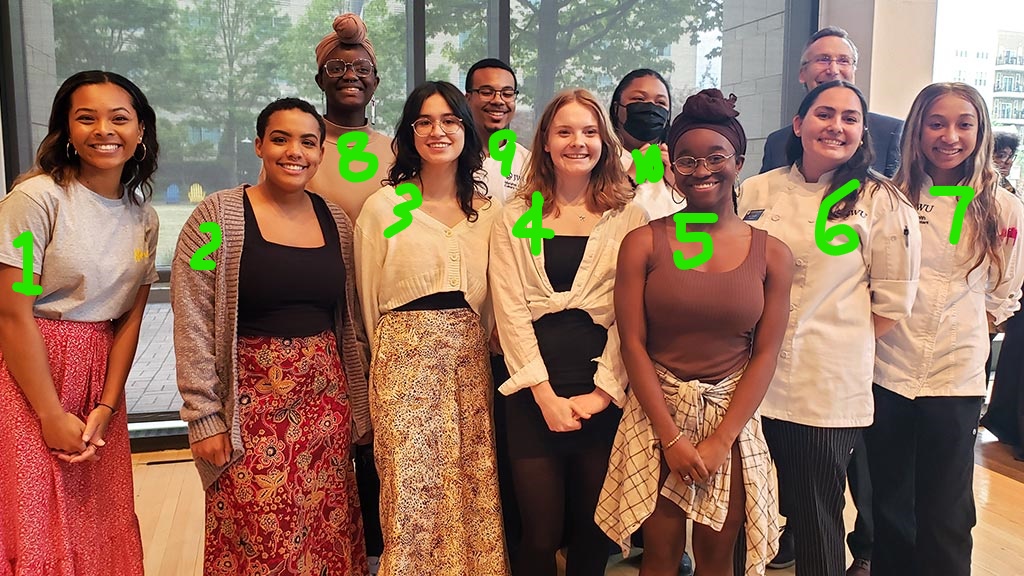
Rosenthal explained that the symposium was an important opportunity for people to come together across all programs to see exemplary work being done and celebrate the accomplishments of others. “The symposium was born out of the idea that it benefits us all to understand the breadth and depth of student scholarship and collaboration across campus. It allows us to identify opportunities for future collaboration, understand the interdisciplinary and experiential learning that's already taken place, and quite frankly, gives us a public opportunity to show the pride we have in our students and our institution.”
Rosenthal added, “By giving a big picture of the exemplary work being done, this symposium helps us identify even more collaborate and experiential learning opportunities as we move forward.”
What’s Next for the Student Research, Design & Innovation Symposium
Many at JWU expect the symposium to become an annual tradition so that interested students can showcase their hard work.
Sukalakamala had a message for students who might wish to participate in future symposiums: “Just be yourself and feel free to express your showcase by using your creativity!”
Meanwhile, Stiles already has an idea for next year’s JWU Student Research, Design & Innovation Symposium. “I would like to see more of our faculty build projects/experiences into their syllabi as requirements so that we have an even larger variety of presentations among our students,” he said.
If they build it, the community will come, enjoying another opportunity to see and celebrate Wildcats’ work.
